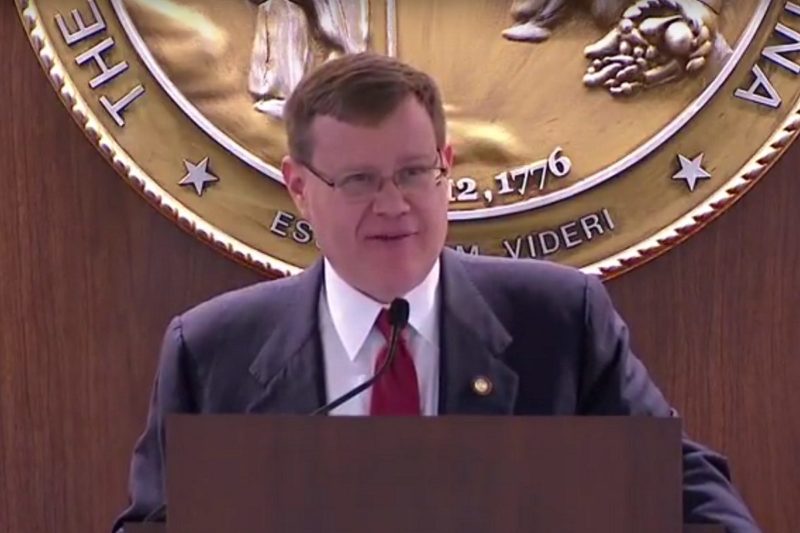North Carolina GOP Wants Another Discriminatory Voter ID Law as Court Orders 2017 Special Elections
The 2017 special elections will be held after the state's racially gerrymandered districts are redrawn.

The North Carolina General Assembly legislative session that kicks off in January could see the return of Republican-backed discriminatory voter ID measures that were struck down by the courts.
The renewed push to limit voting access comes as a federal court on Tuesday ordered North Carolina to hold a special legislative election with a redrawn district map in November 2017. Republican legislators told the Charlotte Observer that they would use a legal challenge to fight the court’s decision.
Earlier this year, the courts ruled that 28 state house and senate districts on the current map were racially gerrymandered by GOP lawmakers. The 2017 special elections will be held after the districts are redrawn.
North Carolina House Speaker Tim Moore (R) said in a recent news conference that lawmakers could revisit the state’s voter ID laws and other election-related policies in 2017 in light of Republican Gov. Pat McCrory’s re-election failure, according to the News & Observer.
Although McCrory’s defeat by Democratic challenger, North Carolina Attorney General Roy Cooper, ended the state GOP’s total government control, the state assembly retained the overwhelming Republican majority it has had since 2011.
The GOP-majority assembly passed sweeping legislation in 2013 that shortened early voting, eliminated same-day voter registration, and required voters to present a government-issued ID card, among other restrictions.
The Fourth Circuit Court of Appeals in July struck down the legislation, which had been dubbed “the worst voter suppression law in the country” by the Advancement Project, a Los Angeles-based civil rights group.
A 2014 report by the General Accounting Office confirmed that Black voters are less likely than their white counterparts to have the types of identification required to obtain a ballot. Meanwhile, a 2012 study by the Advancement Project noted that Latino voters are also negatively affected by voter ID laws.
After the district court ruled that North Carolina’s voter ID laws violated the 1965 Voting Rights Act, McCrory sought a stay from the U.S. Supreme Court. His effort to have the law reinstated failed after justices issued a split decision.
North Carolina Republican Party Executive Director Dallas Woodhouse dismissed the Court ruling and urged county elections boards to “make party line changes to early voting” by reducing hours and eliminating Sunday voting.
Similar efforts to disenfranchise Democratic-leaning voters have continued following McCrory’s loss to Cooper in the governor’s race.
Cooper as of Monday evening maintained a 9,700-vote lead, but McCrory has yet to concede the election or apologize for his party falsely accusing citizens of casting illegal ballots, according to the News & Observer.
Bob Hall, executive director of Democracy North Carolina, a nonpartisan watchdog organization, analyzed the false claims McCrory and his allies made. Relying on records from the Department of Public Safety and the State Board of Elections, Democracy North Carolina looked at all 43 residents that the McCrory campaign had accused of illegally voting with a felony on record.
Democracy North Carolina’s analysis found that nearly half of the people accused were not actually serving a felony sentence. Six of the accused were not serving a sentence at all, while 13 were on probation for misdemeanor violations and retained their right to vote.
Democracy North Carolina spokesperson Jen Jones said in a phone interview with Rewire that even Republican-led county boards of elections were dismissing McCrory’s protests.
“The governor is protesting decisions by his own party. We’re seeing him protesting the counts of his own party’s work,” Jones said.
Democracy North Carolina launched a campaign right before Thanksgiving demanding the exiting governor concede and move on.
“People are looking for things to do and this is a way to get them involved,” Jones said, adding that the petition had amassed about 2,300 signatures as of Monday.
Immediately after the election, the group launched an initiative to oversee the counting of provisional ballots in cases involving same-day registration and one where voter eligibility was in question, Jones said.
Democracy North Carolina had the largest nonpartisan field and poll monitoring campaign in the nation for Election Day, according to Jones. The effort boasted more than 1,000 volunteers who monitored precincts with a history of problems and helped citizens navigate the polls, she said.
The North Carolina NAACP on Monday held an event to speak out against policies seeking to undermine voting for people of color.
The NAACP chapter in October filed a lawsuit alleging that county boards of elections had illegally canceled several thousand voters’ registrations solely because a single piece of mail had been returned as undeliverable from the addresses they were registered with.
A federal judge for the Middle District of North Carolina issued an emergency injunction less than a week before Election Day, halting the cancellations.
Other pending election-related lawsuits in the state include a case brought on November 22 by the conservative think tank Civitas Institute. The Raleigh-based group sought an expedited hearing to delay a final count of ballots for the governor’s race, the Winston-Salem Journal reported.
Civitas had asked a federal court to keep the state elections board from certifying election results until it has vetted all same-day registrants.
Jones told Rewire a court hearing for the Civitas Institute lawsuit will be held Friday.
